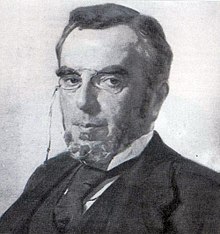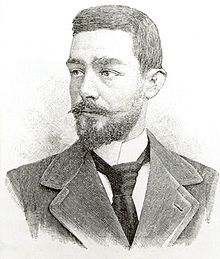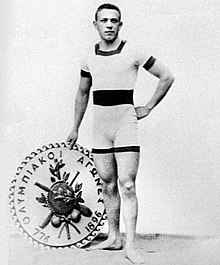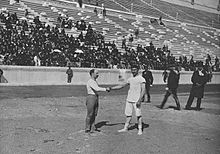1896 Summer Olympics
Organised by the International Olympic Committee (IOC), which had been created by French aristocrat Pierre de Coubertin, the event was held in Athens, Greece, from 6 to 15 April 1896.[3]: 43–44 Pierre de Coubertin, a French pedagogue and historian, adopted William Penny Brookes' idea to establish a multi-national and multi-sport event—the ancient games only allowed male athletes of Greek origin to participate.[4][5] In 1890, Coubertin wrote an article in La Revue Athlétique, which espoused the importance of Much Wenlock, a rural market town in the English county of Shropshire.The Greek government did this despite the cost of refurbishing the stadium in marble already being funded in full by Evangelis Zappas forty years earlier.Concerned that a six-year waiting period might lessen public interest, congress members opted instead to hold the inaugural Games in 1896.In the following years, both Coubertin and Demetrius Vikelas would offer recollections of the selection process that contradicted the official minutes of the congress.Vikelas made the Athens proposal official on 23 June, and since Greece had been the original home of the Olympics, the congress unanimously approved the decision.Because of this financial and political instability, both prime minister Trikoupis and Stephanos Dragoumis, the president of the Zappas Olympic Committee, which had attempted to organise a series of national Olympiads, believed that Greece could not host the event.[3]: 111–118 In late 1894, the organising committee under Stephanos Skouloudis presented a report that the cost of the Games would be three times higher than originally estimated by Coubertin.Their efforts culminated on 7 January 1895 when Vikelas announced that crown prince Constantine would assume the presidency of the organising committee.[16] Women were not entitled to compete at the 1896 Summer Olympics, because de Coubertin felt that their inclusion would be "impractical, uninteresting, unaesthetic and incorrect".[22]: 324 During the 2004 Games, Panathinaiko Stadium served as host for archery competitions and was the finish line for the athletic marathon event."Afterwards, nine bands and 150 choir singers performed an Olympic Hymn, composed by Spyridon Samaras, with words by poet Kostis Palamas.Thereafter, a variety of musical offerings provided the backgrounds to the Opening Ceremonies until 1960, since which time the Samaras/Palamas composition has become the official Olympic Anthem (decision taken by the IOC Session in 1958).Spyridon Louis, a previously unrecognised water carrier, won the event to become the only Greek athletics champion and a national hero.Although Greece had been favoured to win the discus and the shot put, the best Greek athletes finished just behind the American Robert Garrett in both events.[35] An appraisal of a famous photo of series 2 of the 100 meters sprint, performed by facial recognition experts of the Chilean forensic police, concluded that Subercaseaux was one of the participants.Flameng won the event, after a fall, and after stopping to wait for his Greek opponent Georgios Kolettis to fix a mechanical problem.[40] The fencing events were held in the Zappeion, which, built with money Evangelis Zappas had given to revive the ancient Olympic Games, had never seen any athletic contests before.Louis Zutter, a Swiss gymnast, won the pommel horse, while Greeks Ioannis Mitropoulos and Nikolaos Andriakopoulos were victorious in the rings and rope climbing events, respectively.The official English report states:[32]: 99–100 The Regatta could not take place because some special boats embarkation had not been provided for.The German version states: The sailing competitions were cancelled because neither had we provided the special boats for it, nor had foreign applicants registered.Rowing races were scheduled for the next day, 1 April 1896 (Julian); however, poor weather forced their cancellation.In the afternoon however the storm was still on the increase, some of the lighter embarkations were thrown on the shore by the violence of the waves, and the elements continued to rage with such fury that every idea of a boatrace had to be given up.The German rower, Berthold Küttner, wrote several articles about the 1896 Games that were published in his Berlin rowing club's magazine in 1936 and reprinted in the Journal of Olympic History in 2012.He went on to state that the single sculls and race for naval boats were postponed until the following day, then ultimately cancelled when the weather worsened.Boland and Traun decided to team up for the doubles event, in which they reached the final and defeated their Greek opponents after losing the first set.[45] On the morning of Sunday 12 April (or 31 March, according to the Julian calendar then used in Greece), King George organised a banquet for officials and athletes (even though some competitions had not yet been held).Again, the royal family attended the ceremony, which was opened by the national anthem of Greece and an ode composed in ancient Greek by George S. Robertson, a British athlete and scholar.The King then formally announced that the first Olympiad was at an end and left the Stadium, while the band played the Greek national hymn and the crowd cheered.[48] Like the Greek king, many others supported the idea of holding the next Games in Athens; most of the American competitors signed a letter to the Crown Prince expressing this wish.Egypt is also sometimes included because of the participation of Dimitrios Kasdaglis, a Greek national who resided in Alexandria after living in Great Britain for years.The IOC has retroactively assigned gold, silver and bronze medals to the three best placed athletes in each event to comport with more recent traditions.












AthensNationssportsGregorian CalendarJulian CalendarOpened byGeorge IStadiumPanathenaic StadiumParis 1900romanizedOlympic Gamesmodern historyInternational Olympic CommitteePierre de CoubertinUnited States teamsilver medalcopperbronze medalsJames Connollytriple jumpUnited StatesmarathonSpyridon LouisGermanwrestlergymnastCarl SchuhmannAncient Olympic GamesNeo Phaliron VelodromecyclingZappeionfencingCrown Prince ConstantineOlympic HymnSpyridon SamarasKostis PalamasKing George1900 Summer OlympicsIntercalated Games of 19062004 Summer OlympicsOlympicspedagogueWilliam Penny Brookesmulti-sport eventMuch WenlockShropshireWenlock Olympian GamescricketfootballquoitsEvangelis ZappasKonstantinos ZappasGeorge AveroffSorbonneUniversal ExpositionDemetrius Vikelasroyal familyprime ministerCharilaos TrikoupisTheodoros DeligiannisStephanos DragoumisStephanos SkouloudisdrachmasembassyOlympic Village1932 Summer OlympicsPrince Georgeindividual road raceSwimmingBay of Zeasport shootingKallitheatennisAthens Lawn Tennis ClubseaportmarinavelodromeKaraiskakis Stadiumarcheryathletic marathonShootingMarathon (city)AthleticsPanathinaiko StadiumGymnasticsWeightliftingWrestlingOlympic ringsBaron Pierre de CoubertinEaster MondayGeorge I of GreeceOlympic flame1920 Summer Olympics1972 Olympic GamesRowingsailingAthletics at the 1896 Summer Olympicsdiscusshot putRobert Garrettworld recordsThomas Burke100-meter400-metercrouch startLéon FlamengPaul MassonLeonidas PyrgosFlatowWeingärtnerLuis SubercaseauxChilean forensic policeStamata Revithiexcluded women from competitionCycling at the 1896 Summer OlympicsInternational Cycling Associationtrack cyclingtime trialGeorgios KolettisAdolf SchmalAristidis KonstantinidisFencing at the 1896 Summer Olympicsépéefoil eventEugène-Henri Gravelotte